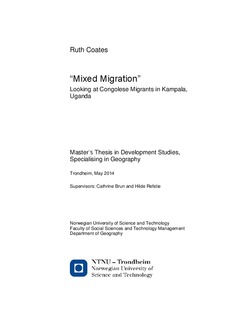| dc.description.abstract | This master‘s thesis explores the concept of ‘mixed migration‘ among the Congolese urban migrant population in Kampala, Uganda. The two labels of forced‘ and voluntary‘ migrants become increasingly blurred as people move over growing distances for a variety of reasons. The labels these migrants are given determine what rights and help they are entitled to. The focus of this research is on the migrants who had chosen to stay in the urban setting, effectively stripping them of all their rights due to violating the Ugandan practice of placing refugees in settlements in rural areas. Many migrants are not used to living in a rural environment, and therefore choose to come to the urban setting to better their abilities to make a living.
The study explores why some people end up with a refugee status while others do not, even if their migration stories are similar. The migrants‘ perspectives towards the Ugandan regime were the main focus, and also if the migrants rights were being fulfilled. What became clear during the research is that it is not necessarily the cause of movement which determines what labels the migrants are given, or if they chose to register at all. By exploring the migration stories of 30 Congolese migrants and how they survive in Kampala it became evident that the label they ended up in was influenced by ways in which they maneuvered the migration regime in Uganda. Their choices were influenced by information received from their networks of fellow Congolese migrants, and therefore their ‗agency‘ is important for a proper understanding of why people end up with different labels. The migrants are not passive but, in a somewhat limited way, active participants in the status determination process. Individual perceptions of the labels and rights, and the opportunities and challenges that follow influenced of the migrants‘ choice to register as refugees or use other means to be able to stay in the city. Some did not see the benefits of registering or were concerned about making themselves known in the city for insecurity reasons.
The study is about making visible the complexity of migration populations and is also an attempt to ‘open up‘ the refugee label and to show the diversity among the people in it along with the constructed divisions it is based on. In order to reach durable solutions for people who move away from a country in conflict, it is important to understand the complexity of their situation. It became clear in the study that the migration policies in Uganda did not reflect migrants‘ realities, which corresponds with the concept of ‗mixed migration‘ and why it was introduced. | nb_NO |
